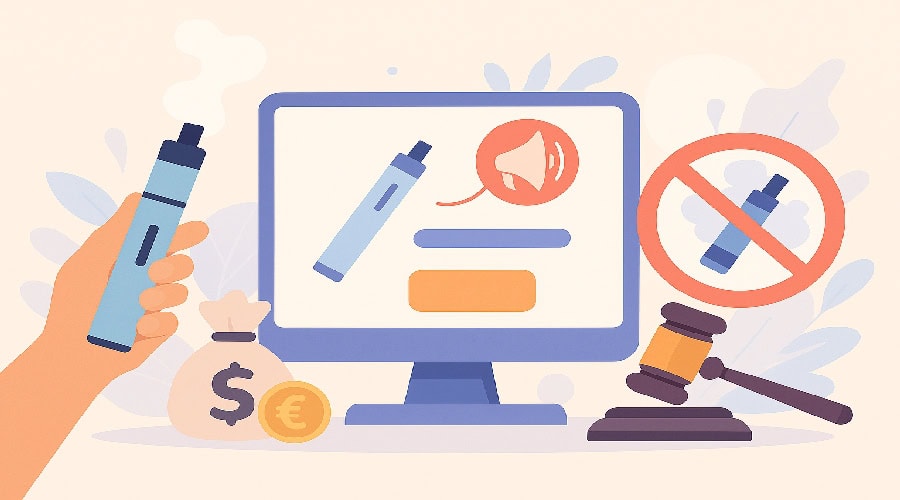Affiliate Programs for Vapes and E-Cigarettes Fall Foul of the Law: ASA Ruling Sends Industry-Wide Warning

The UK’s Advertising Standards Authority (ASA) has delivered a stark warning to the vaping industry: affiliate programs promoting e-cigarettes may be illegal — and ignorance is no defence. In a decisive ruling against Pixus Online Ltd, trading as Juicemate, the ASA declared that the company’s affiliate programme breached UK advertising laws by indirectly promoting nicotine-containing e-cigarettes via online media. It also targeted Apollo technology (see our previous coverage here).
This isn’t just a slap on the wrist. It’s a shot across the bow for any brand relying on performance-based marketing in a highly regulated industry.
The Affiliate Trap
Juicemate’s now-removed “Vape Affiliate Program” promised bloggers and content creators “a healthy, rewarding commission for every sale you deliver.” Sounds like standard affiliate marketing fare — except the products in question were unlicensed, nicotine-containing e-cigarettes. Under UK law, these products cannot be promoted in certain media — including websites and social platforms — unless they are licensed as medicines (which almost none are).
The ASA determined that by setting up an affiliate program to promote these products online, Juicemate had broken the law, even if the affiliate creatives themselves weren’t directly reviewed or approved by the brand.
Why This Ruling Matters
This decision reinforces that affiliate marketing is not a legal loophole. Whether you’re a brand or an affiliate, the law sees no distinction between an ad you place yourself and one placed on your behalf by an incentivised third party.
If your affiliates are promoting banned products in restricted spaces — such as paid Google ads, influencer posts, blogs, or YouTube reviews — you are just as liable as if you ran the ads yourself.
The Legal Landscape
The CAP Code, enforced by the ASA, mirrors the UK’s Tobacco and Related Products Regulations 2016. Rule 22.12 is crystal clear:
“Marketing communications with the direct or indirect effect of promoting nicotine-containing e-cigarettes and their components which are not licensed as medicines are prohibited in some media, including online media.”
That includes affiliate links. It includes influencer shoutouts. It even includes “unpaid” blog reviews if there’s any commercial relationship or incentive involved.
Affiliate Marketing’s Grey Zone Just Got Black and White
For years, some vaping companies have quietly built affiliate programs to scale their reach without directly violating advertising restrictions. But this ruling exposes the legal fragility of that model.
- Brands can no longer claim ignorance if their affiliates break the rules.
- Affiliates promoting vape products risk being party to illegal promotions.
- Affiliate networks and platforms could also come under fire for facilitating campaigns that breach advertising law.
What Vape Brands and Affiliates Need to Do Now
- Shut down non-compliant affiliate programs immediately.
- Audit all current affiliate and influencer relationships.
- Avoid promoting nicotine-containing e-cigarettes online unless licensed as medicines.
- Provide clear compliance training and guidelines to affiliates.
- Consult legal and regulatory experts before launching any marketing initiative involving restricted products.
Conclusion: This Isn’t a Blip — It’s a Blueprint for Enforcement
The ASA’s ruling against Juicemate is not an isolated case. Other vaping companies have also been penalised in recent months, showing a clear enforcement trend. Affiliate marketers and brands can no longer rely on the “we didn’t know” defense. The message is clear:
Affiliate marketing does not exempt you from the law. If your product can’t be promoted in certain spaces, neither can your affiliates promote it for you.
For an industry that thrives on performance marketing, this is a serious moment of reckoning.






